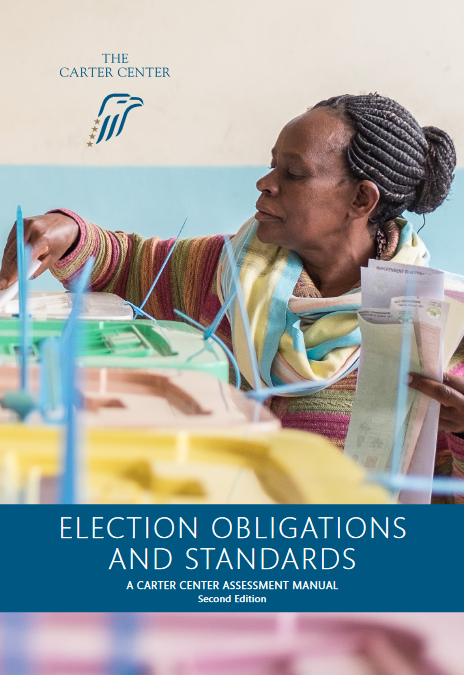Last November, the Center dispatched nonpartisan observers to polling places throughout Fulton County, Georgia, the state’s largest county and home of The Carter Center. It was the first time the Center observed the voting process in a U.S. election after more than 110 in other countries. Observers watched to see that poll workers followed proper procedures, voters were not intimidated or harassed, and officials handled ballots properly. The Carter Center’s observation efforts contributed to the closure of the state’s investigation of Fulton County elections.
“Our observers reported no serious irregularities that could have affected the outcome in Fulton County,” said Avery Davis-Roberts, associate director of the Center’s Democracy Program. “There were a few minor glitches, most of which can be overcome with additional training of election workers, but overall it was a very clean and well-run election.”
After the election, The Carter Center observed the Georgia Secretary of State’s risk-limiting audit, which is a statistical process that checks the accuracy of the vote count. Again, no problems were cited.
Election observation on a national scale would be hard to accomplish in the U.S., Davis-Roberts said.
“Observing a national election in the United States would be a big challenge because every state has its own set of laws and rules,” she said. “We’re looking at the possibility of a statewide observation, but even that would have some high legal and logistical barriers to overcome, depending on the state.”
Two consecutive elections in Tunisia were marked by very low voter turnout, an indication of democratic backsliding in the country, said Sarah Johnson, Democracy Program associate director.
“Citizens in Tunisia don’t see democracy working to improve their lives,” Johnson said. And, in a context where the government is operating by presidential decree, Tunisians increasingly are concerned that their votes are meaningless.
Just 8.8% of the country’s eligible voters cast ballots in the Dec. 17 parliamentary elections, a historically low turnout. The Jan. 29 runoff election again failed to motivate voters, generating just 11% turnout.
The Center made several recommendations to address Tunisia’s democratic backsliding. It urged key leaders to engage in national dialogue and urgently address the following issues:
“The Tunisian people deserve a transparent government that seeks to address the pressing political, economic, and social issues that prompted the [2011] revolution” that overthrew the dictatorial president and installed a democratic government, the Center said in a post-election statement. “Tunisia’s leaders must deliver on these aspirations and return Tunisia to the democratic path it embarked on in 2011.”
In contrast, in Brazil the Center did not mount a full, detailed observation, instead sending a six-person electoral expert mission. The Center’s team commended Brazilian voters and officials for the successful general election held on Oct. 2, 2022, and subsequent presidential runoff on Oct. 30.
The mission was made up of experts from Argentina, Germany, Portugal, Spain, and the United States. They focused on several key issues related to the functioning and transparency of the voting technology systems, dis-information about the use of those systems, and the legal framework governing the use of voting technology.
Broader election observation missions organized by Brazilian and international observers reported that the election was well-organized and conducted with timeliness and transparency, including in publishing final results.
“Brazil executed a very good election in a complex electoral environment,” said David Carroll, director of the Carter Center Democracy Program. “Widespread disinformation failed to discourage voters from casting their ballots on either day, and the outcome reflected the will of Brazilian voters.”
One week after the new president, Luiz Inácio Lula da Silva, was inaugurated, a violent mob attacked the offices of Brazil’s three constitutional powers: the executive, legislative, and judicial branches. The Carter Center condemned the attack, reiterating that the election was fair and the results accurate.
“Political polarization exists in vibrant democracies like Brazil,” the statement read, “but the rule of law provides mechanisms for peaceful dissent that do not include violence and destruction.”
 The Carter Center on March 28 released a new edition of its Election Obligations and Standards manual during the second global Summit for Democracy, held in Lusaka, Zambia.
The Carter Center on March 28 released a new edition of its Election Obligations and Standards manual during the second global Summit for Democracy, held in Lusaka, Zambia.
The 326-page manual provides a detailed framework for assessing the democratic nature of elections, based on international standards rooted in human rights It helps election observers, citizens, and researchers understand how fundamental rights and freedoms, such as the right to vote, freedom from discrimination, and freedom of assembly, apply to each part of the electoral process.
Many countries around the world experienced setbacks in democracy since the first manual was introduced in 2014 In addition, to address new developments and challenges that influence how we think about elections, the guide has been modernized to include updates on issues such as violence against women in politics, mis- and disinformation, accessibility for persons with disabilities, data privacy, and more.
Please sign up below for important news about the work of The Carter Center and special event invitations.